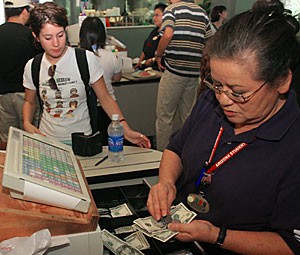The student unions may seek financial assistance from the university, propose another fee or enforce a mandatory meal plan in order to keep services financially secure, union officials said.
Since the proposed union fee was rejected last spring, a 5 percent price hike has been implemented across the board for services that are provided by the student union, said Dan Adams, director of Arizona Student Unions.
“”Five percent is pennies in some instances,”” said Adams. “”But in the long run, that is going to cost more than $20 (the amount that the fee would have been).””
However, the price hike isn’t enough to solve the budget crunch, so union officials are devising long-term plans to keep the student union financially secure. Adams said he is open to suggestions from anyone who can come up with a feasible plan.
Mandatory meal plans and union fees are not uncommon at universities around the country. Both Northern Arizona University and Arizona State University have mandatory meal plans, Adams said.
“”It puts us in the financial position to do what we need to do,”” Adams said. “”(But) it’s not a very warm fuzzy feeling to move toward that kind of plan.””
The price increases, which were made deliberately, will be seen when purchases are made at union-run establishments. Union officials did not add the full 5 percent to every item and avoided overpricing things such as bottles of water, Adams said.
Service costs, maintenance and bond payment increases are all issues that union officials are balancing when finances come into question, said Nick Adamakis, director of marketing for Arizona Student Unions.
“”Identifying that source of new revenue is what we’re really looking at,”” Adamakis said. “”We don’t want to be where we were five years ago when we had a building that was falling apart.””
Still, Adams said he is not eager to instate a meal plan for on-campus residents, as it would restrict students’ flexibility to spend their money.
The Arizona Board of Regents has moved hearings on new fees from March to October this year, meaning decisions concerning potential fees will be made earlier than usual, Adams said.
Installing more user fees is another way the student union plans to generate revenue, Adams said.
Student organizations will now have to pay a $25 user fee to register as a campus organization or club, Adams said.
Some programs could potentially feel the sting of the tighter union budget.
The Gallagher Theater film program will also need to keep ticket sales rolling because if the bottom line drops, the program could go up for evaluation, Adams said.
Last year, the University Activities Board put together a concert for the Wildcat Welcome that cost the union $25,000. This year there will not be a fallback fund from the union, Adams said.
If an organization like the UAB exhausts its funds, it’s done for the year, Adams said.
Perks and services like the computer lab in Wilbur’s Underground in the Student Union Memorial Center could also be subject to a user fee. When these computers wear out, they will have to be replaced, and the union needs the money to do that, Adams said.
Students said a lab fee would discourage them from using the computers.
“”When I’m in a hurry, this lab is very important to me,”” said Donald Yuen, an engineering senior. “”But I wouldn’t use it if there was a fee.””
The student union will also shut down at 10 p.m., while Wilbur’s Underground will close at midnight. Redington Restaurant will open for breakfast at 7 a.m. in order to generate more revenue, Adamakis said.
Brian Seastone, University of Arizona Police Department police commander, and Anthony Daykin, UAPD chief of police, enjoy starting their day by grabbing a bite to eat at places off campus, their homes, the Cactus Grill and now the Redington Restaurant.
“”The Redington room is always a nice little escape from the hustle and bustle of campus,”” Daykin said as he and Seastone enjoyed orange juice before their breakfast burritos and biscuits and gravy arrived.









